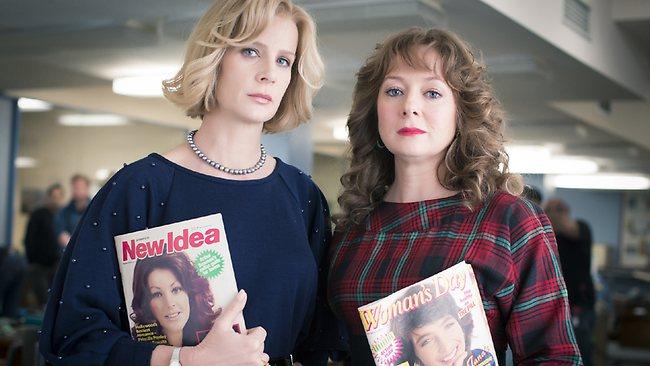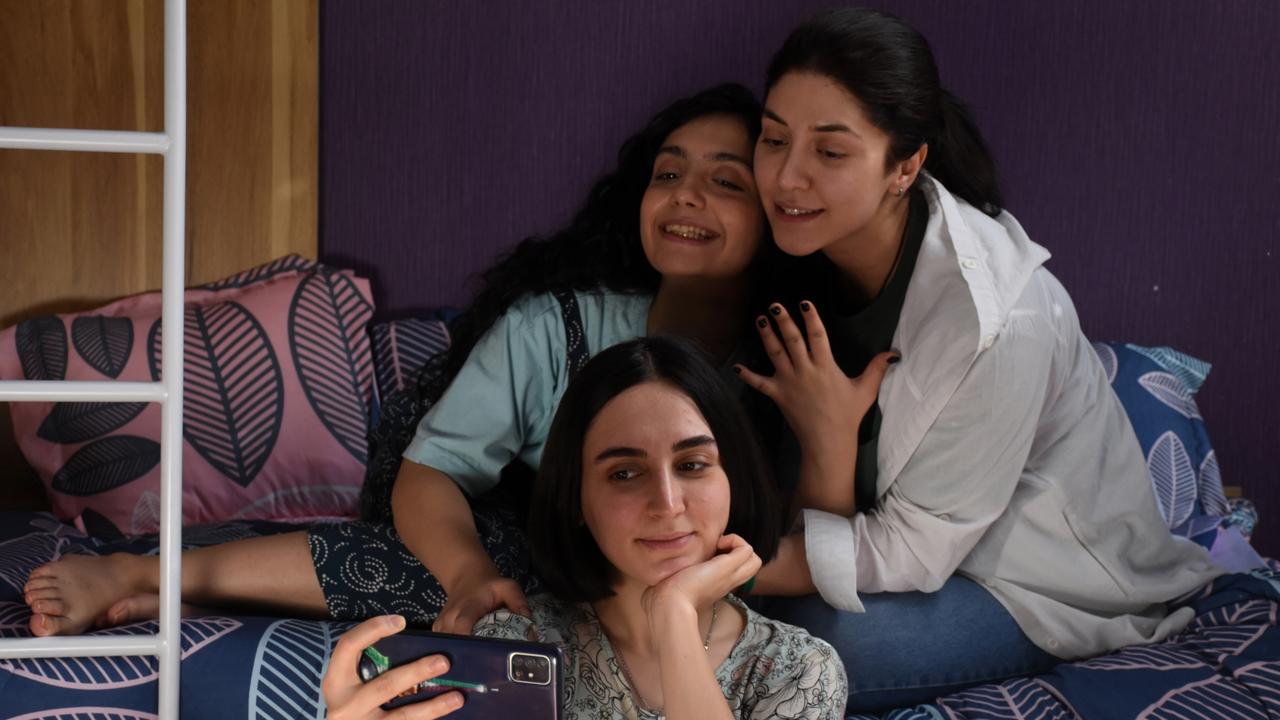War of wordsmiths breaks out in Paper Giants as magazine bosses clash
A NEW drama portrays one of the magazine world's great rivalries.

MEDIA magnate Kerry Packer is alone in his rather gloomy office. It's 1981 and his prized editor Ita Buttrose has just been poached by Rupert Murdoch's lieutenant Ken Cowley to edit The Daily Telegraph, making her the first female editor of a major metropolitan newspaper in Australia.
Packer reads the press announcement while standing at his desk, two fingers spread in a V shape on the item.
His poker face gives little away. He asks to be connected to Cowley. "I've just called to tell you couldn't get a better editor," he says, deadpan. He nods several times and hangs up. Then he looks quizzically at the newspaper again for a long moment. Abruptly he hurls almost everything on his large desk to the floor, turns and picks up his chair and hurtles it across the room. He prowls, silent for a moment, then stands looking out of his window. "F . . king Rupert," he snarls.
This is the way Paper Giants: Magazine Wars begins. It's a decade on from the events of Paper Giants: The Birth of Cleo, the first season in this epic series that depicts the so-called "paper wars" that saw Packer and Buttrose turn the magazine world on its head. Written by Keith Thompson and Justin Monjo and produced by Mimi Butler, the new two-part drama is again impressively directed by Daina Reid. This time they tell the story of the golden years of the glossies and the battle waged by larrikin Nene King and refined Dulcie Boling to make their respective publications, New Idea and Woman's Day, the No 1 seller in the country.
The Packer scene at the beginning links the two seasons, as does the casting of Rob Carlton as the feared ACP boss. The luminous, contained Rachel Griffiths plays Boling, possessed of a freezing smile, while an irrepressible Mandy McElhinney inhabits the sometimes destructive life force called King. While The Birth of Cleo narrative was structured as essentially a two-hander dealing intimately with Buttrose's life and somewhat more discreetly with Packer's, Magazine Wars involves several stories within stories, all disparate journeys.
There's King and her relationship with the love of her life, the initially dissolute Pat Bowring (Angus Sampson), the very private Boling, young journalists Nick Trumpet (Khan Chittenden) and Beth Ridgeway (Caren Pistorius), both championed by King, and the Machiavellian, grimly omnipresent Packer.
The first episode starts a little slowly, with so many characters to establish and a new decade to contextualise. It's now 1987, years after that first pre-title scene featuring the Packer rage at Murdoch. King is working for Boling at the Murdoch-owned New Idea. Boling, restrained and regal, is the consummate businesswoman, King the office wild cannon, but together they have pushed New Idea's circulation above the one million mark. Their conflicts grow to open warfare and when King is refused editorship of the booming TV Week, a staple of the supermarkets, she is fired.
Meanwhile Packer, having sold the Nine Network to a gullible, puffed-up Alan Bond (Steve Rodgers), has bought Woman's Day in Sydney. Its circulation is 400,000 behind that of New Idea, so he hires the sacked King, who stops at nothing to put Woman's Day ahead. She anchors the brand and defines the voice.
"I want exclusives; I want you to get into the parties no one else can; I want to get the shots no one else can," she rants at her staff when she takes over. "I want to know everything about this town who's flying in and who's flying out; who's sleeping with who; who's having a breakdown; who's having a boob job." She's shouting with almost sexual excitement as she charges through the office of Woman's Day, her arms waving, her voice a screech. "You hear me? I want it all. And pictures. Lots and lots of pictures."
As producer Mimi Butler says, the true story was a natural translation for enthralling TV drama, its structure almost Shakespearean. "The Packer and Murdoch kingdoms set the scene for Nene's rejection by Dulcie, where the disaffected heir-apparent goes off, raises an army and comes back to demand a slice of the kingdom," she says. "The characters were strong and clear and defined." And the battle between the women, the continual butting of heads, becomes personal and hurtful, with emotional consequences for both.
Together - led by King, initially, to the chagrin of Doling, according to this script - they helped change the Australian media into a relentless, corrosive machine, both of them selling millions of copies of their magazines each month. Marketplace economics relentlessly drove any decision about what was relevant, fair and necessary information for public consumption about an individual, rather than any thoughtful debate about what was legitimate. This was not journalism, it was gladiatorial conflict in which privacy seen to be irrelevant, nonexistent, or waived in pursuit of photo opportunities.
The machine they created became omnivorous, feeding a monster of cross-pollinating companies, controlled by alchemists - aka publicists - who understood the DNA of celebrity and the chemistry of fame.
But King also understood implicitly that people feel a connection to stars and are pulled into their gravitational field, regarding them as soul mates. She was able to transform stories about them into a subliminal message about money, self-esteem and an almost certainly unattainable lifestyle. "I love gossip and I love celebrities," she tells a bemused Packer. "I'm a typical Woman's Day girl, down at the shopping centre in my T-shirt and tracksuit pants, clinging to all the wrong places I might add, checking on the sales."
It's an image that seems to appal Packer, though he's fond of leering at the well-padded King.
Carlton's performance again is a stunner. As he did in The Birth of Cleo, he plays Packer in a haze of cigarette smoke, a compelling characterisation that captures that neutral, dangerous gaze that relays no warning. It's the look of a man who knows acts of aggression are more effective without notice. But he's oddly charming too, with a soft smile and a small dip of the head revealing affection, the small eyes quietly tracking every woman who crosses his gaze.
Again the series is snappily and intelligently directed by Daina Reid, Monjo's script for the first episode tight and abbreviated - a series of set-pieces propelled by a rollicking period soundtrack from Stephen Rae, most scenes underscored by songs. And again Reid, so good with actors, lets the dialogue scenes breathe, avoiding over-covering them, rarely cutting away to close-ups and allowing the actors to use the space and play off each other, sometimes quite theatrically.
There are wonderful moments of comedy, most of them involving McElhinney's King. She simply delights in this sometimes bawdy over-the-top creature, maybe less a Shakespearean character than one straight out of Chaucer. Her energy dominates every scene in which she appears, Carlton wisely stepping back to allow her the stage.
In one lovely scene she bursts lustily into Packer's office wearing a kind of riding skirt, cowboy belt and brown leather boots. After her monologue peters out he stares at her and his small eyes shift to her feet. "Are you going to a rodeo?" he inquires gently.
Griffiths's performance is less showy but in some ways more eye-catching because of her restraint, a masterclass in underplaying, a lesson in actorly wit and discretion. The support is classy too. Rodger Corser storms into a scene as the ubiquitous Harry M. Miller, smarmy, opportunistic and oleaginous, a show stopper. Angus Sampson's Bowring is sympathetic, a man caught between someone he loves and her overweening ambition, and William Zappa not only looks like Murdoch, he speaks like him too.
But the surprise is Mark Lee's Richard Walsh, who was head of Packer's ACP for many years and, as much as anyone could be, was a kind of adviser and mentor to King. Lee nails the elusive, droll and cerebral Walsh, getting his voice spot-on and a world-weary wryness that never leaves his features.
I enjoyed this series enormously and love the way Butler and her team of filmmakers immortalise moments we once lived and ideas we once held and that helped shaped our culture. In some ways it's like an obituary for the world's best-known consumer titles, from lads' mags to women's weeklies, which are steadily losing their readers as the media landscape changes and digital rivals eat into their circulation.
But there is a kind of subtext too; the series suggests that as a new frontier opens up, a place of increasingly segmented niches, only magazines created by impassioned individual editors such as Boling and King will survive and be successful.
THERE'S a vendetta of a very different kind in the History channel's Hatfields & McCoys, a six-hour US TV-scripted drama screening on Foxtel's Showcase. Three episodes document the resounding true story of the late-19th-century blood feud between the West Virginia Hatfields and the Kentucky McCoys. The murderous conflict created a terrible circle of violence and became a cautionary tale about the way violence so easily perpetuates itself.
The term "Hatfields & McCoys" even became legal shorthand for any pig-headed neighbourhood disagreement. And while the feud became easy fodder for TV comedians and talk show hosts - the last killing was traced to 1947 - it ended symbolically in 2003 when the families united in the aftermath of the September 11 terror attacks.
The series, set in the Appalachian Mountains along the Kentucky-West Virginia border but filmed in Romania for financial reasons, stars Kevin Costner and Bill Paxton and is directed by Kevin Reynolds. It's a rather astonishingly well-produced western, dark and sombre, brooding and violent and, by its end, it's as hard to tell why it started as it probably was at the time. Melancholy hangs over nearly all the scenes as the clash of clans inspires loyalty, passion, vengeance and sacrifice.
It's the American network's first successful foray into scripted drama, and when it aired last year it was the most watched non-sports program in cable TV history. The channel has had problems in the past with history when it comes to scripted shows.
The controversial $30 million miniseries The Kennedys, which eventually ran successfully on little-known US cable network the ReelzChannel, was originally set to air on History, which had commissioned the drama. It was to be its first scripted miniseries. Billed as "an inside look behind the secret doors of the White House", it underwent an unsuccessful year-long effort to bring it into line with the historical record. This raised many questions about the boundaries between dramatic licence and documented fact, smear and tribute, when it comes to biographies of public figures - a loaded issue given enduring political sensitivities about the Kennedy legacy.
Then a last-minute decision was made by History channel executives to drop The Kennedys. They said in a statement: "After viewing the final product in its totality, we have concluded this dramatic interpretation is not a fit for the History brand."
Well, Hatfields & McCoys fits well, a gritty western, saturated with heavily researched detail, full of sometimes suffocating ambushes, chases, bashings and killings, a tragedy of pride and bitterness.
Reynolds gives his images a lumbering sense of realism, characters shuffle and trundle under the weight of difficult times and, possibly, the amount of liquor they consume. And they speak in a florid biblical patois that reminds one of Deadwood. (The script is co-written by Ted Mann, one of that series' most distinguished writers.) The look is distinctive too. The images are slightly smudged in a deathly grey palette, reminiscent of ancient daguerreotypes or those Civil War photographs of Mathew Brady.
Costner is Devil Anse Hatfield and Paxton is Randall McCoy, patriarchs of their respective clans, friends and comrades during the Civil War, who clash on their return. Hatfield deserts towards the end of the conflict but McCoy is imprisoned in a northern concentration camp, implacably bitter when he finds what life Hatfield has built for himself when he eventually limps home.
When volatile, violent Jim Vance (Tom Berenger), Hatfield's uncle, murders McCoy's drunkard brother, another veteran, he fires the first shot in a war that will reach the governors of both Kentucky and West Virginia.
It's really a mythic story of how the west was lost, as all America was, to pointless, ugly violence and men with guns who had little idea of the vacuum of loss they created. These men were not paragons or heroes but bitter and ugly killers.
Costner, who is also executive producer, is as good as he has ever been here, tired and grizzled, his eyes baleful and evaluative under his wide-brimmed hat, as cagey as he is obdurate. Paxton is effective too, though not as charismatic, his Randall McCoy gloweringly pious and permanently enraged. Berenger's Jim Vance steps out of the screen too, a desperado, a coarse and brutal sociopath with a leathery charm. They are all professional men of violence, hard-boiled, vehement and vengeful, living through a time when the traditional moral and social restraints no longer operate.
The History channel is also screening America's Greatest Feud on Saturday, a documentary that looks at the feud with a collection of historians, scholars and descendants, who explore the circumstances of the numerous deaths and revenge-filled deceptions that so affected both families.
Paper Giants: Magazine Wars, Sunday, 8.30pm, ABC1.
Hatfields & McCoys, Saturday, 8.30pm, Showcase.
America's Greatest Feud, Saturday, 1.30pm, History.



